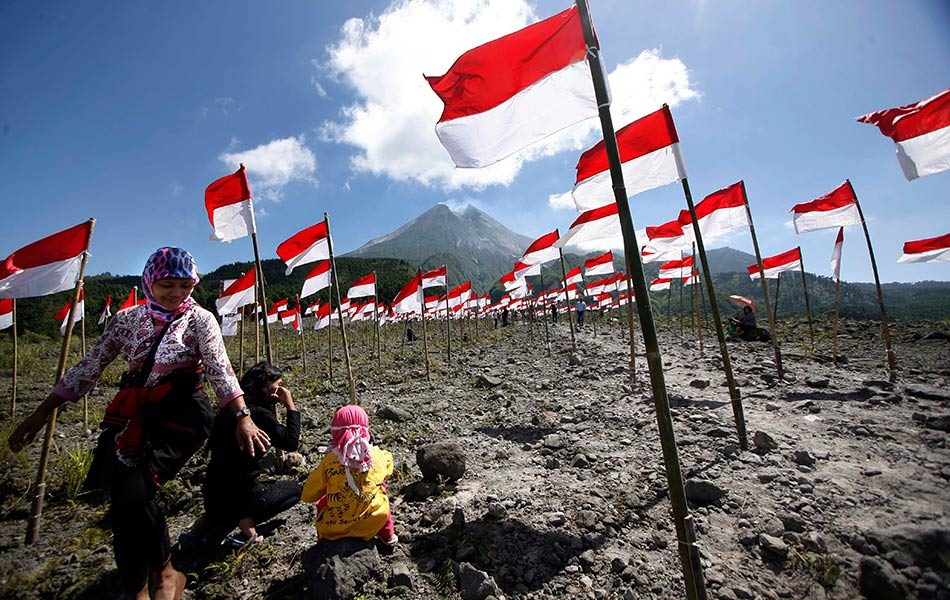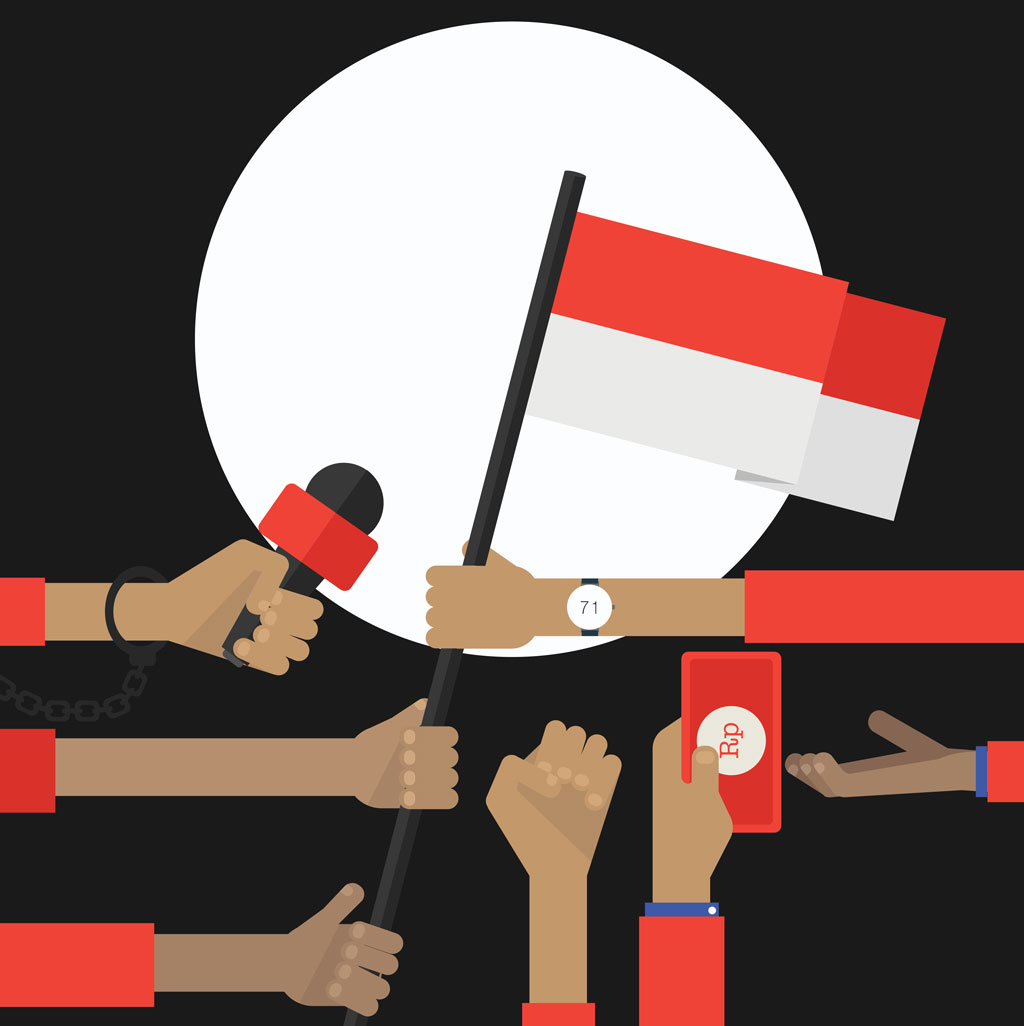Indonesia has a long way to go. Australia should go with it.
“As Indonesia celebrates its 71st anniversary … we also remember that Australia’s support was instrumental in the formation of our nation.”
So wrote the Indonesian Ambassador to Canberra, Nadjib Riphat Kesoema in August as his nation marked more than seven decades of freedom. He added that “the next 15 years are a defining period for Australia-Indonesia and their role in the region.”
On 17 August 1945, Indonesian nationalists proclaimed the country’s independence in what marked the beginning of diplomatic and armed resistance to the archipelago’s Dutch colonial rulers after almost 500 years of occupation by European powers.
Back then, the Australian ‘wharfies’ union joined Indonesian crew members in blockading ships from the Netherlands East-Indies. They declared these ships ‘black’ and refused to load them with arms and supplies for the Dutch colonialists.
As Indonesians struggled against the Dutch, the Australian government worked at the United Nations to have the new republic recognised as a nation.
During Indonesia’s devastating forest fires in Sumatra and Kalimantan last year, Indonesia confirmed that Australia was among five “friendly” countries that provided assistance in firefighting efforts.
Joint counter-terrorism efforts after the 2002 Bali bombings and Australia’s provision of $1 billion in aid for rebuilding Aceh after the 2004 tsunami also reinforced positive cooperation.
Australia has not always had such a positive impact upon Indonesia, however. 1965 saw one of the largest massacres in human history perpetrated in Indonesia. In an effort to annihilate the Indonesian Communist Party (PKI), then the third largest in the world, the army and associated paramilitary groups executed at least 500,000 alleged communists.
The recent International People’s Tribunal held in The Hague found that along with the US and UK, Australia was complicit in crimes against humanity.
According to the panel of judges, “the UK and Australia conducted a sustained campaign repeating false propaganda from the Indonesian army” and continued even when it was “abundantly clear that killings and other crimes against humanity were taking place on a mass and indiscriminate basis.”
Propaganda against those accused of being linked to the PKI legitimised extra-legal persecution, execution and sexual violence. As the mass murders went on, Australia’s embassy maintained relations with the perpetrating Indonesian generals, discussing anti-PKI activities and how Australia could support the military in its consolidation of power.
Then Australian Prime Minister, Harold Holt, gleefully remarked that “with 500,000 to one million Communist sympathisers knocked off, I think it is safe to assume a reorientation [in Indonesia] has taken place.”
Since the inception of Indonesia’s democratic transition or Reformasi in 1998, however, the friendship with Indonesia’s top brass hasn’t been so cozy. Despite promising a foreign policy characterised by “more Jakarta, less Geneva” after his election in 2013, bilateral relations suffered markedly under former PM Tony Abbott.
The execution of ‘Bali 9’ ringleaders Andrew Chan and Myuran Sukumaran in April 2015 sparked outrage among much of the Australian population, commentariat and government. In the wake of the executions, Australia withdrew its ambassador and cut 40 per cent of its aid budget to Indonesia. Meanwhile Australian netizens called to #BoycottBali.
The issue of asylum seekers has been another tense sticking point.
Australia’s unilateral policy of turning back boats under Operation Sovereign Borders has drawn sustained criticism from Indonesia’s government. When Australia’s naval personnel were accused of paying people smugglers $30,000 to return to Indonesia, the foreign ministry said it marked a “new low” in Australia’s management of irregular migration.
Due to the rapidly growing numbers of refugee asylum seekers stuck in limbo in Indonesia, Foreign Ministry spokesman Arrmanatha Nasir requested this March that Australia relax its asylum seeker policy and accept more refugees.
Australian beef has been another point of contention. In July 2015, Indonesia announced it would be drastically reducing its cattle imports from Australia, citing the need for greater self-sufficiency.
Many commentators interpreted this move as reflective of further souring in relations. Politician Barnaby Joyce patched this up when he visited later in the year, securing greater numbers of cattle imports and a partnership on tackling illegal fishing.
Food exports to Indonesia offer a long-term economic opportunity for Australia. The real value of Indonesia’s agrifood consumption is expected to quadruple to US$152 billion by 2050, providing a market ripe for Australia’s high quality vegetables, meat and dairy products.
Despite a testy relationship between our governments and the bad behaviour of some Australians in Bali, Australia’s reputation among Indonesians remains stellar. A recent study by Monash University’s Australia-Indonesia Centre found that a whopping 87 per cent of Indonesians hold a favourable view of Australia.
“It’s clear that Indonesia and Australia have more issues that unite them than divide them,” said the centre’s Chairman, Harold Mitchell AC.
Sadly, in Australia Indonesian studies are on the wane.
At least six Australian universities have closed their Indonesian studies departments since 2004. Only 70 school students in the entirety of New South Wales studied Indonesian at a senior level last year. Australia must combat its English-language complacency and desperately bolster cultural and linguistic capital as we move into the Asian century.
Indonesia faces a raft of challenges including poverty, corruption and human rights abuses. These are issues that Australia can and should assist its important diplomatic partner to address.
The archipelago of 17,000 islands has the fourth largest population, is the third largest democracy, and by 2040 will be the fourth largest economy on the planet. It also happens to be right on Australia’s doorstep.
The opportunities for mutual exchange in terms of trade, education and culture are great. Let’s hope Australia has the wisdom to continue pursuing them.
Max Walden works for an international development NGO in Indonesia and is a Research Assistant with the Sydney Asia Pacific Migration Centre at the University of Sydney.
 Facebook
Facebook  Twitter
Twitter  Soundcloud
Soundcloud  Youtube
Youtube  Rss
Rss 
